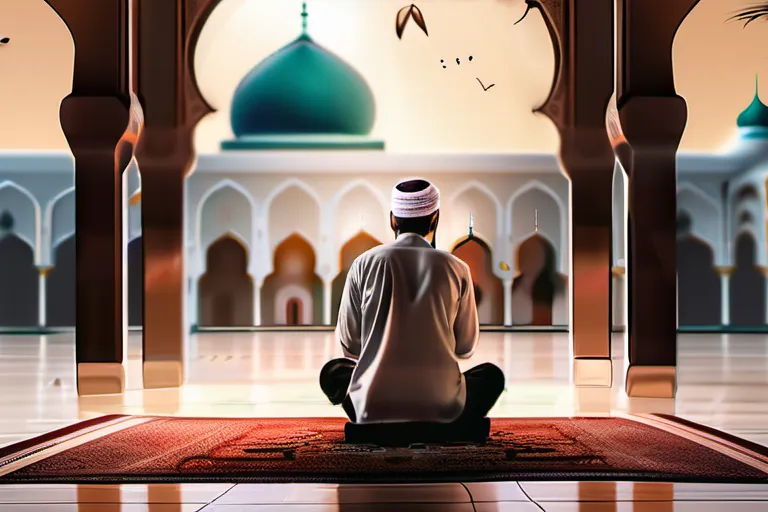Explore the significance, steps, and importance of Wudu in Islam
Wudu is a crucial aspect of Muslim prayer and daily life. In this article, we delve into the meaning, purpose, and steps of performing Wudu according to Islamic teachings.
The Importance of Wudu in Islam
Have you ever wondered why wudu, this simple ritual of washing certain parts of your body, holds such profound significance in Islam? It’s more than just a physical act; it’s a metaphor for cleansing not only the exterior but also the soul.
Imagine stepping into a sacred space to pray, and as you prepare for wudu, you’re reminded that every prayer is a chance to reconnect with the divine. Wudu serves as a bridge between your everyday life and spiritual devotion, ensuring that your heart and mind are as pure as the water used in this ritual.
Consider the importance of maintaining purity during prayer. Just as a canvas needs to be clean before it can capture the beauty of art, your soul requires purification before it can truly engage with divine presence. Purity, then, becomes a state of readiness, both physical and spiritual, for engaging in worship.
But why these specific steps? Why wash your hands, arms, face, mouth, nose, ears, and feet? Each step is carefully designed to cleanse not only the outward body but also to symbolize inner purity. It’s like washing away the dirt of life’s challenges, leaving behind a sense of freshness and renewal.
Moreover, wudu reinforces the importance of intention in prayer. As you perform each step, your mind is focused on cleanliness and spiritual preparation, setting the tone for a meaningful encounter with God. It’s like preparing to meet an old friend after a long time – you want to look your best and be ready to converse.
In essence, wudu is more than just ritual; it’s a gateway to deeper spiritual engagement. By cleansing yourself both physically and spiritually, you’re opening the door to a closer relationship with Allah, ensuring that your prayers are sincere and pure.
Preparing for Wudu: The Necessary Conditions
Before diving into the ritual of Wudu, it’s crucial to understand the conditions that must be met before performing this act of purification. Are we not all in need of such moments of renewal and cleansing? Just as a river flows gently to cleanse the earth, our souls also seek purification through Wudu.
In Islam, Wudu is more than just a physical washing; it’s a spiritual preparation for worship. It’s important to be in a state of impurity before performing Wudu, as this sets the stage for renewal and reverence. Could you ever imagine starting your day without first preparing yourself mentally and physically? Similarly, Wudu is an essential prelude to prayer.
The intention or Niyah is also a critical component before beginning Wudu. Without the right mindset, even the most meticulous washing might fall short of its intended purpose. Have you ever tried to clean a window with just a cloth and water without truly intending to make it spotless? The result wouldn’t be as satisfying or thorough.
Moreover, ensuring that one is not impure by natural means such as urine, blood, or semen is vital. These are states of significant impurity in Islamic practice. Can you imagine starting a prayer with an untidy mind or body? It would be akin to trying to write a masterpiece with smudged hands and a disorganized mind.
Finally, the conditions must also include having pure water. Water is essential not only for the physical cleansing of Wudu but also as a symbol of purity in faith. How many times have you felt refreshed after drinking clear, clean water? It’s that essence of freshness that we seek in our spiritual lives through Wudu.
By fulfilling these conditions, one sets the foundation for a meaningful and effective Wudu. It’s not just about washing; it’s about preparing oneself to meet the divine with a heart and soul free from impurities. As we delve into the steps of performing Wudu in our next chapter, let us remember that each step is a step toward spiritual renewal.
The Steps of Performing Wudu
Now that we’ve covered the necessary conditions for performing Wudu, let’s dive into the steps involved in this sacred ritual. Imagine yourself standing before a mirror, each step reflecting your intention to cleanse not just the body but also the soul.
- Washing Hands: Start by rinsing your hands thoroughly. Think of it as washing away the dust and grime that life might have brought you. Make sure to clean under your nails where impurities can hide. Is there a spot on one hand that always seems to get overlooked? Take a moment to focus, making sure no dirt or filth remains.
- Cleansing Face: Next, move to cleansing the face. Picture wiping away not just the sweat and dust but also any negative thoughts or emotions that might cloud your mind. Pay attention to every part of your face, ensuring no corner is left uncleaned.
- Rinsing Forearms: Moving down to the forearms, imagine washing away the burdens of daily life. These areas are often overlooked but just as important. Focus on each segment from wrist to elbow, making sure every inch feels refreshed and renewed.
- Cleansing Head: The head is a symbol of wisdom and intellect. As you wash it, think about cleansing your mind and spirit. Pay attention to the scalp and hair, ensuring no impurities are left behind.
- Rinsing Feet: Finally, cleanse your feet. Think of them as the grounding force that connects you to the earth. Wash between the toes carefully, for these spaces can often be forgotten but carry their own share of impurities.
The ritual of Wudu is more than just a sequence of actions; it’s a journey of purification and reflection. Each step serves as a reminder to cleanse not only physically but also spiritually. By following these steps diligently, you honor the teachings of Islam and connect with the divine in a profound way.
Exceptions to the Rules of Wudu
Now, let’s explore some exceptions to the rules of Wudu that might arise in various circumstances. What if you’re menstruating and can’t perform a complete ablution? Or what about those days when your body is unwell and the process feels challenging?
In such situations, qit’ah (a partial wudu) comes into play. It’s like taking a mini-break from your daily routine to maintain a level of purity until you can perform full Wudu later on. This practice is particularly useful during menstruation or when dealing with minor illnesses that make it temporarily difficult to carry out the full ablution.
Imagine Wudu as a river flowing through your body, cleansing every part with its pure and refreshing waters. However, what do you do when this river dries up for a moment? You don’t stop all hope; instead, you take a sip of water from another source until the main stream resumes its flow.
During menstruation, women are allowed to perform qit’ah by washing only parts of their body that are not affected. This means they can clean areas like hands and face while waiting for the menstrual cycle to end so they can resume full Wudu. Similarly, if you’re ill and can’t wash certain parts due to pain or discomfort, you can perform a partial ablution focusing on what you can.
These exceptions highlight the flexibility within Islamic practices, ensuring that spiritual duties remain accessible even when life throws unexpected challenges your way. It’s a reminder that our relationship with Allah is more about intention and sincerity than rigid adherence to rituals in every moment of weakness or illness.
By understanding these exceptions, we can appreciate the thoughtful guidance provided by Islam. Just as a doctor might prescribe different medications for different ailments, Wudu offers various methods suited to diverse circumstances. This adaptability ensures that our spiritual journey remains both meaningful and manageable.
The Spiritual Significance of Wudu
The Spiritual Significance of Wudu: Explore the spiritual benefits and symbolism associated with Wudu, including purification, humility, and submission to Allah.
Imagine standing in front of a mirror, ready to cleanse yourself both physically and spiritually. Wudu is like a mirror that reflects your true self—the pure essence hidden beneath layers of daily dirt and distractions. It’s a ritual that invites you to step back from the chaos of life and reconnect with something deeper and more profound.
Through this act, you’re not just washing away physical impurities; you’re symbolically cleansing your soul. The water used in Wudu becomes a metaphor for the spiritual purity that comes from aligning your heart with Allah’s will. It’s like washing your hands to clean them of dirt, but here, it’s about purifying your intentions and actions.
The act of performing Wudu is also an exercise in humility. Just as a plant needs water to thrive, our souls need the nourishment of remembrance and submission to Allah. Each step in the ritual is like a gentle reminder to bow down before the One who created us and guides us.
But Wudu isn’t just about what you do; it’s also about how you do it. The sequence of actions, from rinsing your hands to wiping your head, each has its own significance. It’s as if every step is a prayer in itself, reinforcing the idea that even the smallest acts can have profound spiritual impact.
Moreover, Wudu serves as a daily reminder to approach life with a clean slate. In a world filled with noise and distractions, it offers a moment of clarity, a chance to pause and reflect on your relationship with Allah. It’s like hitting the reset button in the digital age—giving yourself a fresh start every time you perform this ritual.
In essence, Wudu is more than just a religious obligation; it’s a spiritual journey that invites us to live our lives with greater awareness and intentionality. By engaging in this practice, we open ourselves up to deeper levels of understanding, compassion, and devotion—qualities that enrich not only our spiritual life but also our interactions with others.
Maintaining the Integrity of Wudu
Understanding Wudu: The Islamic Purification Ritual
Now, let’s delve into the practical aspects of maintaining the integrity of Wudu. Have you ever wondered why it is crucial to follow each step in sequence? Imagine preparing a complex recipe; just as each ingredient and action must be added at the right time, so too does Wudu require adherence to its steps. By doing so, we ensure that the ritual remains pure and effective.
Firstly, let’s consider the sequence of steps. Just like a well-choreographed dance, each movement in performing Wudu has its place. Starting with washing your hands and face, then moving on to the arms, mouth, nose, ears, and finally the feet, every action is interlinked. Disrupting this sequence can render the ritual incomplete, negating all previous efforts.
Next, think of distraction as a rogue wave in the calm sea of concentration required for Wudu. It’s easy to let our minds wander during such moments, especially when engaging with daily tasks or conversations. However, maintaining focus is akin to holding a delicate flower: one must handle it carefully and attentively. By staying present and undistracted, we honor the ritual’s spiritual essence.
Lastly, consider how your environment can affect Wudu’s integrity. Performing Wudu in a bustling market with constant distractions may make it difficult to concentrate fully on each step. Ideally, finding a quiet corner or space that allows you to focus without interruptions is essential for maintaining the ritual’s purity. It’s like setting up a serene garden within the chaos of daily life.
By understanding and applying these tips, we can ensure that Wudu remains not just a physical act but also a spiritual practice. Each step then becomes a reflection of our commitment to purification, humility, and submission to Allah. As we follow through with precision and mindfulness, the ritual transforms into a profound expression of faith.
Conclusion
 By understanding the importance of Wudu, Muslims can deepen their connection with Allah and maintain spiritual purity in their lives.
By understanding the importance of Wudu, Muslims can deepen their connection with Allah and maintain spiritual purity in their lives.











